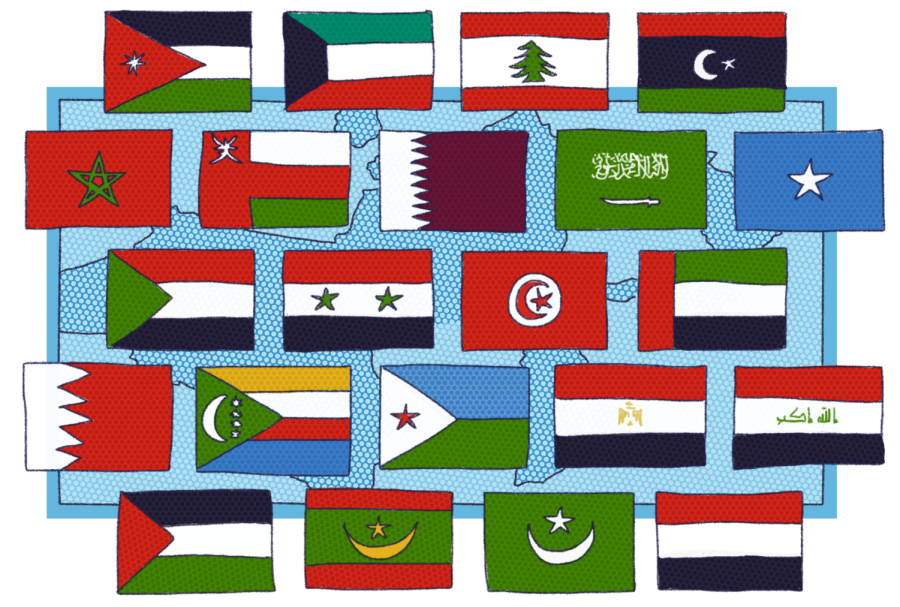Arab American Heritage Month offers time of reflection, conversations about culture, identity
April 29, 2022
Editor’s Note: This article first appeared in the April 26, 2022 flipbook.
When Youssef Negm first moved to the U.S. from Cairo, Egypt, for safety reasons after the Arab Spring and Egyptian Revolution, he said he felt his Arab heritage weakened by being surrounded by predominantly white peers.
“I was trying to get rid of (my) Arab heritage because I was young. I was trying to be American and act cool,” said Negm, an accounting and finance senior. “Now, since I (have) matured more, my Arab heritage is very strong, and I’m proud of it.”
April, recognized as National Arab American Heritage Month, celebrates Arab American heritage and culture, paying tribute to the contributions of the 3.7 million Arab American and Arabic-speaking people from the 22 countries in the Middle East and North Africa. It was first celebrated in April 2017 as an initiative and recognized last April by President Joe Biden.
Born to Lebanese immigrant parents and raised in Houston, nutrition freshman Hadi Noureddine said he recognizes the importance of embracing both parts of his identity, such as by being involved in UT’s Arab Students Association.
“We aren’t strictly Lebanese, and we’re not strictly American. We’re in this kind of strange gray area in between,” Noureddine said. “It’s not less valuable than that of a strictly Arab identity, and it definitely isn’t less valuable than just an American identity. It’s something that can be appreciated as a unique identity.”
Freshman mechanical engineering and Egyptian American student Karim El-Khazindar said he has prioritized embracing his Egyptian identity despite moving to different countries.
“It’s really special to be from a different place because you bring a different experience and a different perspective,” El-Khazindar said. “You can’t forget where you’re from, because where you come from makes up your identity.”
Noureddine said he immersed himself in Lebanese culture while growing up by speaking Arabic in his house, cooking Arab food with his mom and listening to Arab music. Now, after gaining American influence from school, he melds the two identities together.
“I really wanted to immerse myself in the culture because I felt that there was something missing,” Noureddine said. “I always really wanted to be Arab, especially since it’s just my immediate family here and the rest of my extended family is abroad in Lebanon.”
Negm said he was one of many Arab American students who had not heard of Arab American Heritage Month, but appreciated that there was a month where they were respected and celebrated.
“I see people celebrating a lot of different ethnicities, and I’ve never seen anything for Arabs, (so) knowing (about) this (month) made me kind of proud,” Negm said. “Arabs are always experiencing racism, abusive language towards them (and) a lot of different things that shouldn’t they shouldn’t be, (so) they should be promoting this out there.”
Mechanical engineering sophomore and Bahraini and Palestinian American student Noor Khoury said despite being born in Houston, she spent her childhood in Qatar and went to high school in Bahrain. She said she enjoys encouraging that part of her identity.
“I grew up in the Middle East, (and) that’s where my home is,” Khoury said. “When I go back home, I feel at peace. I don’t want to lose that Arab background. I want to keep on displaying where I’m from.”
Biology freshman and Iraqi American student Mina Sabri said celebrating Arab contributions such as historical civilizations, architecture and language would be a good way to celebrate Arab American Heritage Month.
“This month connects all Arabs together,” Sabri said. “There’s a special charm to being Arab. It’s important to keep that for future generations, so they know their people (and) all the big accomplishments that we’ve done.”
‘You can’t forget where you’re from’
Arab American Heritage Month offers time to reflect on the importance of Arabic culture to Arab American students.












